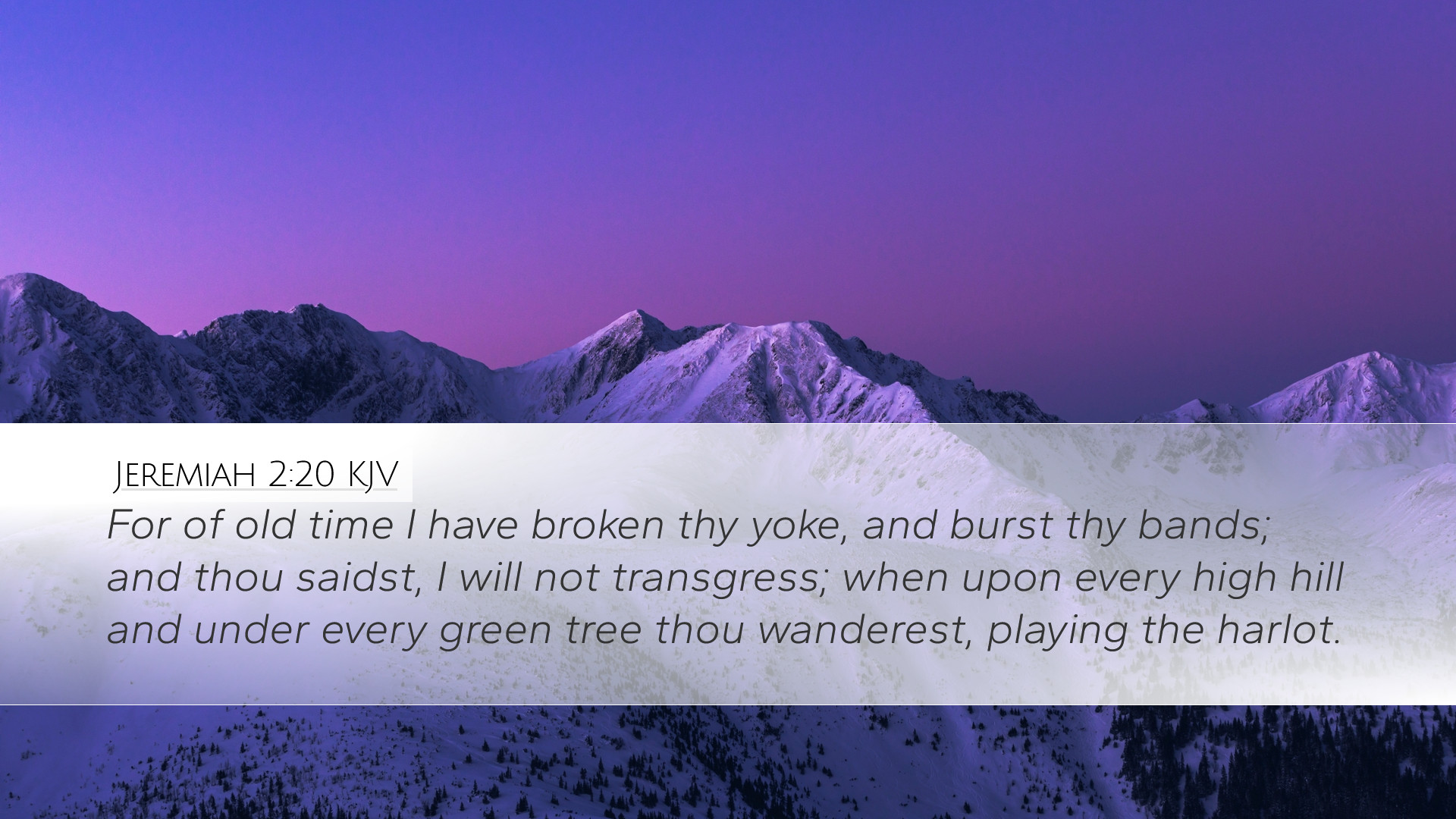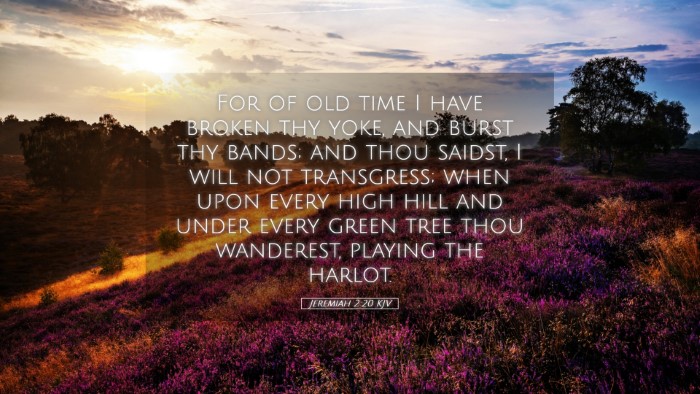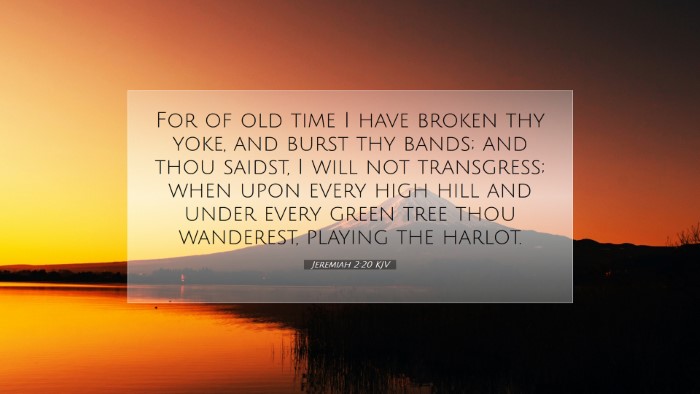Commentary on Jeremiah 2:20
Jeremiah 2:20 reads: "For of old time I have broken thy yoke, and burst thy bands; and thou saidst, I will not transgress; when upon every high hill and under every green tree thou wanderest, playing the harlot."
This verse encapsulates God’s discussion with Israel, symbolizing their covenant relationship and the recurrent theme of unfaithfulness that typifies the prophetic literature. The verse can be analyzed through various lenses that illuminate its theological implications.
Contextual Background
The book of Jeremiah serves as a prophetic treatise addressing the people of Judah prior to the Babylonian exile. It contains strong admonitions against idolatry and a reminder of the covenant relationship between Yahweh and His people. In Jeremiah 2, God laments Israel’s apostasy, reflecting the broader themes of God's faithfulness juxtaposed with human unfaithfulness.
Insights from Public Domain Commentaries
Matthew Henry's Commentary
Divine Deliverance: Matthew Henry emphasizes God's act of breaking the yoke of servitude imposed by sin. The yoke represents oppression and bondage, and God's intervention signifies the liberation meant for His people. He notes that this liberation was meant to inspire gratitude and obedience.
The Nature of Backsliding: Henry points out that despite God's mercies, Israel's heart persisted in rebellion. The phrase "I will not transgress" highlights the fleeting resolves of the people, who promised faithfulness but repeatedly returned to sin. This serves as a cautionary reminder of the human tendency to revert to old ways even after experiencing divine favor.
Albert Barnes' Notes on the Bible
The Symbolism of Yoke and Bands: According to Barnes, the "yoke" signifies the constraints of sin, while "bands" denote the connections that bind one to transgression. The act of God breaking these symbolizes His desire to free His people from the snares of sin. Barnes elaborates that God’s effort in freeing them should result in a responsive change in their behavior.
Idolatry's Allure: Barnes notes the contrast between the high hills and green trees—common sites for idol worship in ancient Israel. The mention of wandering "under every green tree" illustrates the people’s infidelity and disobedience in seeking pleasures outside of God’s ordained way. This reflects the allure of temptation and the ease of straying from God’s commands.
Adam Clarke's Commentary
Historical Context: Clarke contextualizes the verse within Israel's history, particularly noting the deliverance from Egypt and the subsequent covenant at Sinai. He underscores that despite the profound act of divine rescue, Israel's behavior was akin to spiritual harlotry, choosing infidelity towards God.
The Call for Repentance: Clarke sees this verse as a clarion call for repentance. By acknowledging their errant ways, the people could restore their relationship with God. The implication is clear: genuine repentance must be accompanied by a commitment to turn away from idol worship and back toward faithfulness to God.
Theological Reflections
This passage serves as a poignant reminder of the heart's propensity towards sin and the continual need for vigilance in one's spiritual walk. It reflects several theological themes:
- Divine Sovereignty: God's control over history and His ability to deliver His people from the bonds of sin.
- Covenant Faithfulness: God's expectation of fidelity from His covenant people, and the consequences of their unfaithfulness.
- The Nature of Sin: The metaphor of spiritual harlotry illustrates the seriousness of idolatry and the need for sanctified living.
- Call to Repentance: The opportunity for restoration underscores God's grace and mercy, despite human transgressions.
Pastoral Applications
For pastors and church leaders, Jeremiah 2:20 provides a robust framework for addressing congregational issues related to idolatry and unfaithfulness. Key applications include:
- Teaching on Idolatry: Educating the congregation on modern forms of idolatry that can distract from faithful worship.
- Encouraging Accountability: Fostering a culture of support where individuals can confess sins and seek reconciliation with God.
- Highlighting God’s Grace: Reminding congregants of the importance of God’s mercy, stressing that despite our failings, God is always ready to forgive and restore.
- Leading in Prayer and Repentance: Incorporating prayers of confession and turning back to God in worship services as a regular practice.
Conclusion
Jeremiah 2:20 offers profound insights into the dynamics of the relationship between God and His people. The themes of liberation, fidelity, and the dangers of idolatry resonate across generations. As contemporary readers engage with this text, it serves as both a warning and an invitation to faithfully return to the Lord, who has graciously opened the path to restoration.


